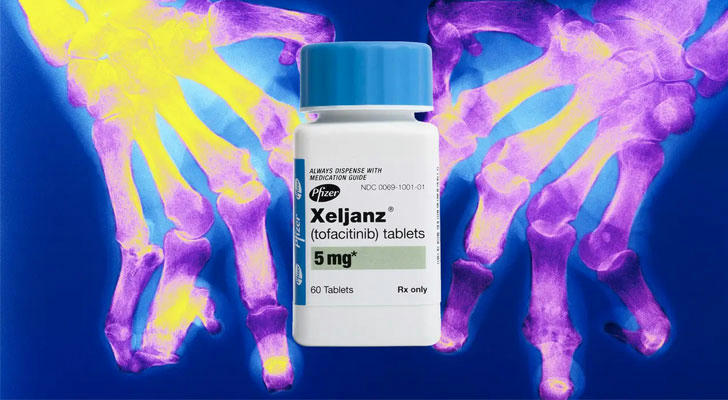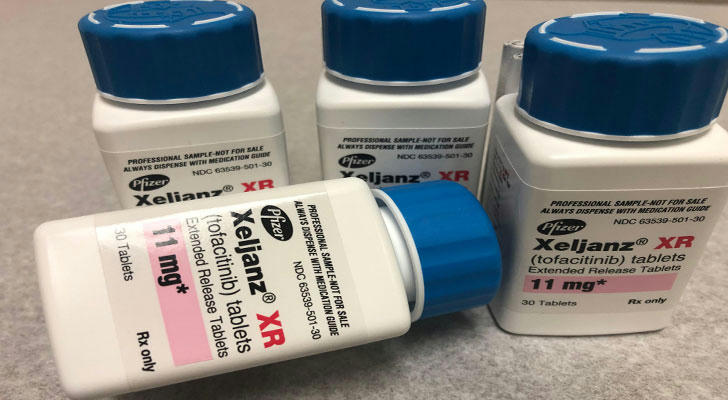Is Xeljanz Right for You ? Key Factors to Consider Before Starting Treatment

Xeljanz is a medication used to treat rheumatoid arthritis (RA), psoriatic arthritis (PsA), and ulcerative colitis (UC). It works by blocking specific enzymes that cause inflammation. Available in pill form, Xeljanz is often prescribed when other treatments have failed. While it helps reduce pain and swelling, it may have side effects, so it should be used under medical guidance.
Overview of Xeljanz:
Xeljanz is a medication used to treat rheumatoid arthritis (RA), psoriatic arthritis (PsA), and ulcerative colitis (UC). It works by blocking specific enzymes that cause inflammation. Available in pill form, Xeljanz is often prescribed when other treatments have failed. While it helps reduce pain and swelling, it may have side effects, so it should be used under medical guidance.
Conditions Treated:
1. Rheumatoid Arthritis (RA): An autoimmune condition that causes joint pain, swelling, and potential damage.
2. Psoriatic Arthritis (PsA): A type of arthritis associated with psoriasis, leading to joint pain and inflammation.
3. Ulcerative Colitis (UC): A chronic inflammatory bowel disease that causes inflammation and ulcers in the colon and rectum.
Common Side Effects:
1. Headache: A common problem for some users.
2. Diarrhea: Varies in severity among patients.
3. Nausea: Gastrointestinal discomfort may occur.
4. Upper Respiratory Tract Infections: This category includes colds or sinus infections.
5. High Blood Pressure: Monitoring is recommended as Xeljanz may increase blood pressure.
Serious Risks:
1. Infections: Increased risk of serious infections, including tuberculosis and other bacterial, fungal, or viral infections.
2. Blood Clots: Risk of developing blood clots, such as deep vein thrombosis (DVT) or pulmonary embolism.
3. Liver Issues: Potential liver enzyme abnormalities require regular monitoring.
**4. Elevated Cholesterol Levels:**Some users may experience increased cholesterol.
5. Gastrointestinal Perforations: Particularly in those with a history of ulcers or inflammatory bowel disease.
6. Cancer: Long-term use may increase the risk of certain cancers, including lymphoma and skin cancer.
Considerations for Patients with Other Health Conditions:

1. Pre-existing Conditions: Those with a history of infections, liver disease, or cancer should be carefully evaluated. Xeljanz may worsen some conditions or increase complications.
2. Comorbidities: Conditions like high blood pressure or high cholesterol need careful management, as Xeljanz can impact these.
3. Overall Health: Assess how Xeljanz affects your existing health conditions and ensure that its benefits outweigh the risks.
Impact on Other Health Conditions:
1. Infections: If you have a history of infections or immune system issues, Xeljanz’s risk of serious infections requires careful consideration.
2. Liver Conditions: Xeljanz can affect liver function. Regular liver monitoring is necessary if you have liver disease.
3. Heart Health: The medication may raise cholesterol levels and increase blood clot risk. Monitoring is needed if you have cardiovascular issues.
4. Cancer Risk: There may be a higher risk of certain cancers. This needs to be weighed against Xeljanz’s benefits.
5. Gastrointestinal Issues: Xeljanz may exacerbate conditions like ulcers or inflammatory bowel disease. Regular monitoring and preventive measures may be needed.
Additional Monitoring Needs:

**1. Regular Blood Tests:**To check for potential side effects such as liver abnormalities and changes in blood cell counts.
2. Infection Screening: Frequent check-ups to catch early signs of infections.
**3. Cardiovascular Monitoring:**Regularly monitor blood pressure and cholesterol levels.
**4. Liver Function Tests:**To detect any liver abnormalities early.
**5. Cancer Screenings:**If you have a history of cancer or are at higher risk, regular screenings may be necessary.
Cost of Xeljanz:
Xeljanz’s cost can range from $3,000 to $4,000 per 30-day supply without insurance. Prices vary by dosage and pharmacy.
Insurance Coverage:
1. Insurance Plans: Many plans cover Xeljanz for RA, PsA, and UC, though coverage details such as co-pays and deductibles vary.
2. Formulary Status: Check with your insurance provider to see if Xeljanz is covered and understand potential out-of-pocket costs.
3. Prior Authorization: Some plans require prior authorization, meaning your doctor may need to provide additional information to justify its use.
Financial Assistance:
1. Patient Assistance Programs: Pfizer offers financial assistance for those who qualify, potentially providing Xeljanz at a reduced cost or for free.
2. Co-Pay Assistance: Pfizer also provides co-pay cards to help with out-of-pocket expenses.
3. Non-Profit Organizations: Some organizations offer medication assistance.
4. Discount Cards: Pharmacy discount cards may reduce costs.
User Cases:
**1. Rheumatoid Arthritis:**Sarah, 45, found relief from joint pain and swelling with Xeljanz after other medications failed.
**2. Psoriatic Arthritis:**John, 38, experienced less joint pain and improved skin symptoms with Xeljanz.
**3. Ulcerative Colitis:**Lisa, 32, saw fewer flare-ups and less abdominal pain with Xeljanz after struggling with other treatments.

Final Considerations:
Consult your healthcare provider to evaluate if Xeljanz is appropriate for your condition and to plan for monitoring and managing any potential side effects.
